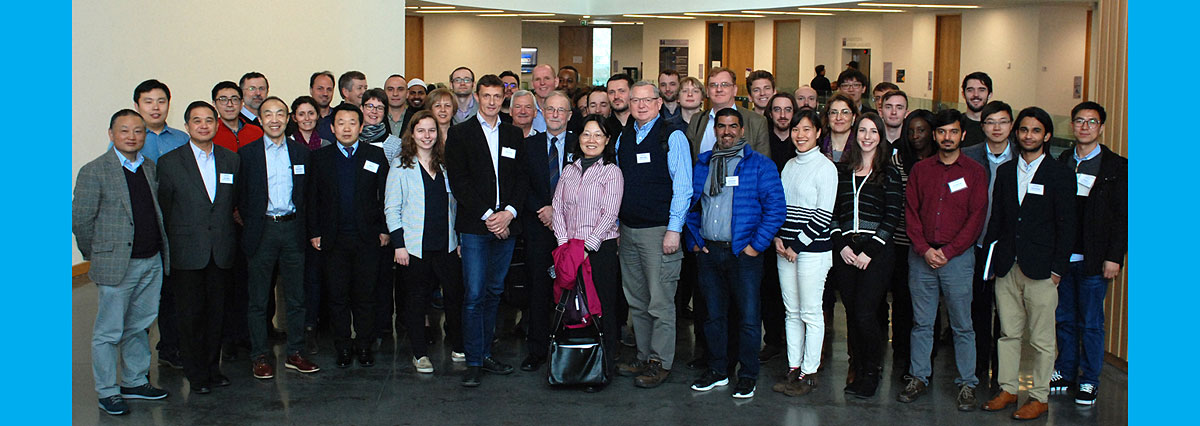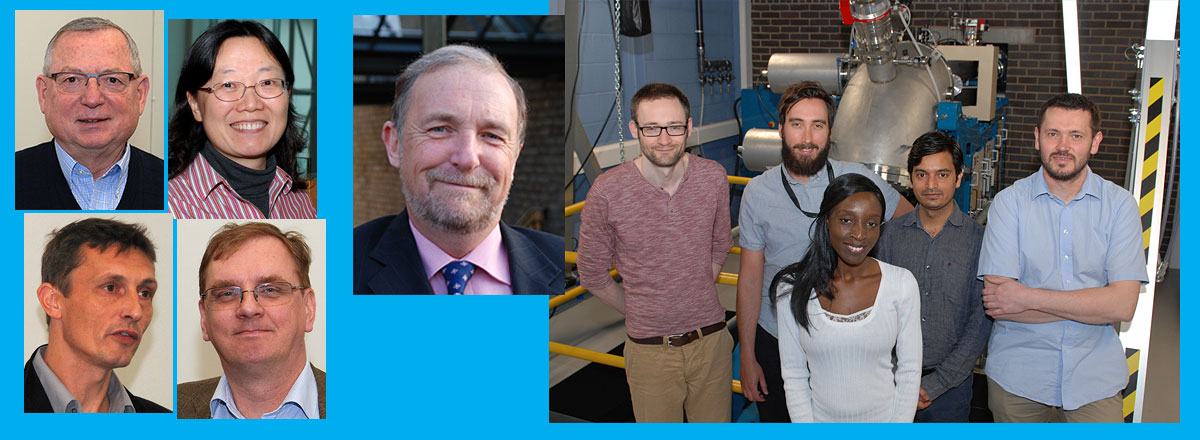 Conference speakers and delegates
Conference speakers and delegatesThe 5th Workshop On TEM With In Situ Irradiation (WOTWISI) was organised by Huddersfield’s Electron Microscopy and Materials Analysis Research Group
THE University of Huddersfield is home to one of the world’s finest facilities for investigating materials using transmission electron microscopy (TEM) coupled to a particle accelerator. Now, 50 of the world’s leading scientists in the field have assembled at the University for the latest edition of a globetrotting conference.
The event was the three-day 5th Workshop On TEM With In Situ Irradiation, known as WOTWISI-5. It was attended by scientists from nine countries, including the USA, Japan, China, Australia and Finland. They are specialists in a technique that allows the minute observation of radiation damage in a wide range of materials whilst the irradiation is being induced with ion and/or electron beams. The nuclear industry is a key sector for this research.
Previous gatherings have taken place in Japan, France and the USA and the inaugural WOTWISI was in 2010, in Salford, where it was launched by Professor Stephen Donnelly and Dr Jonathan Hinks. They are creators of the MIAMI (Microscopes and Ion Accelerators for Materials Investigation) facilities that are now located at the University of Huddersfield, under the auspices of the Electron Microscopy and Materials Analysis (EMMA) Research Group.
MIAMI-2 – with its dual ion beams linked to an electron microscope – was constructed after receiving £3.5 million in funding from the Engineering and Physical Sciences Research Council. It was recently officially opened by the University’s Emeritus Chancellor, Sir Patrick Stewart, and is already in global demand as a research facility.
During WOTWISI-5, parties of delegates were given a guided tour of the facility and one of the timetabled talks at the conference was a description by Dr Graeme Greaves, Senior Research Fellow at EMMA.
Among the nine U.S. visitors was the first keynote speaker, William Weber, of the University of Tennessee. He discussed the effect of electronic energy loss on damage production and evolution in ceramics.
The other invited speakers were Sylvain Peuget of CEA, the French nuclear industry research body, on waste storage glass, radiation effects and the need for TEM with in-situ irradiation studies; Yanwen Zhang, of Oak Ridge National Laboratory, talked about defect evolution in concentrated alloys; and Kai Nordlund, of the University of Helsinki, who spoke on channelling effects in nanostructures.
There was a total of 23 presentations, including two by Huddersfield research fellows. The two were Dr Emily Aradi, who described the effects of irradiation on tungsten nanoparticles, and Dr Anamul Haq Jeris Mir, who explained his work on the formation of noble gas precipitates in glasses and glass ceramics.
The delegates were welcomed by Dr Hinks and there was an opening address from the University of Huddersfield’s Pro Vice-Chancellor for Research and Enterprise, Professor Andrew Ball.
The likelihood is that the sixth WOTWISI will take place in about 18 months at the University of Michigan, where a new TEM facility is under construction.
 Pictured (l-r) keynote speakers William Weber, Yanwen Zhang (top), Sylvain Peuget and Kai Nordlund. Director of the EMMA research group Professor Stephen Donnelly (centre) and the EMMA team (l-r) Dr Graeme Greaves, Dr Rob Harrison, Dr Emily Aradi, Dr Anamul Haq Jeris Mir and Dr Jonathan Hinks
Pictured (l-r) keynote speakers William Weber, Yanwen Zhang (top), Sylvain Peuget and Kai Nordlund. Director of the EMMA research group Professor Stephen Donnelly (centre) and the EMMA team (l-r) Dr Graeme Greaves, Dr Rob Harrison, Dr Emily Aradi, Dr Anamul Haq Jeris Mir and Dr Jonathan HinksMore News
Tungsten not the answer for nuclear fusion reactor
“Though tungsten is a leading candidate, we don’t see how we can use it as a structural material”
Patrick Stewart opens £3.5m ion beam microscope
The actor officially open the £3.5 million MIAMI-2 – Microscope and Ion Accelerator for Materials Investigation
£1.5 million for Material Sciences research
The funding will be used for Material Science and Engineering doctoral projects as part of the Doctoral Training Partnerships
